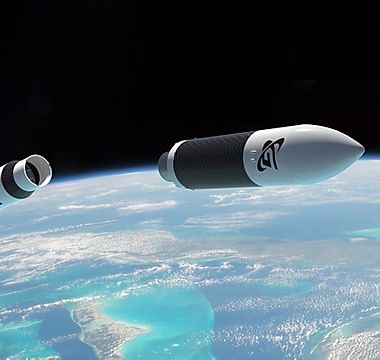Gilmour Space to work with DST on launcher technologies

DST and Gold Coast company Gilmour Space Technologies have signed a partnership to work together on space technologies. Gilmour Space is developing Australia’s first lower-cost, reliable and dedicated launch vehicles to place small satellites in Low Earth Orbits (LEO).
The partnership between DST and Gilmour Space will focus on defence-related technologies including propulsion, materials and avionics technologies, to help develop a three-stage hybrid rocket that will make the launch of small payloads and satellites more affordable and responsive to urgent user needs.
Gilmour Space’s partnershp agreement with DST follows the signing of a Statement of Strategic Intent and Cooperation with the Australian Space Agency in December last year which focusses on the same goals. Gilmour Space’s aim is to reduce the cost of placing micro and nano satellites in orbit by eliminating launch services as a bottleneck in the process. This will open up an affordable market – Space 2.0 to many – for manufacturers of small satellites, either as one-offs or as commercial constellations. In turn, this will help stimulate space industry activity in Australia.
In February this year, Gilmour Space won a $3 million CRC-P Grant from the Federal Dept of Industry Science and Technology to help develop, with partners University of South Queensland and Teakle Composites, new composite cryotanks for its launch vehicles. In March the company also won a $250,000 grant from the Advanced Manufacturing Growth Centre (AMGC) to manufacture composite tanks for its 3-stage ERIS launcher. To be manufactured in collaboration with Sydney-based CST Aero, these are intended to lower the mass of the tanks and enable up to $1 millions-worth of additional cargo to be transported into LEO per launch.
In 2016 the company conducted a sub-orbital test launch from a launch site in Queensland which also demonstrated the viability of 3D printed rocket fuel. It plans to conduct its first commercial launch in 2022. Minister for Defence, Senator Linda Reynolds CSC, said, “Technology advances have allowed rocket systems and launch service providers to offer access to space at a greatly reduced cost and infrastructure footprint.”
The Minister for Defence Industry, Melissa Price, said the agreement would open the door for Australian space companies to provide space capabilities to the ADF as well as commercial customers.
“Recent advancements in the capabilities of micro and nano-satellites, small satellite constellations and additive manufacturing present a unique opportunity for Defence and Australian industry,” Minister Price said.
